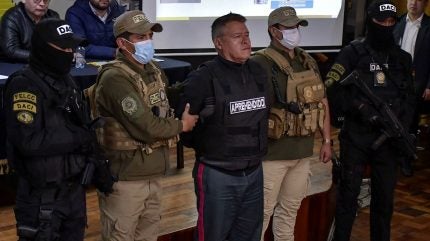
An attempted military “coup” in Bolivia has been entirely thwarted following the arrest of its architect, General Juan José Zúñiga, according to President Luis Arce and Bolivia’s Ministry of Defence (MoD).
Zúñiga, who Arce had recently stripped of his military titles, led approximately 200 soldiers to march on the presidential palace and Congress in La Paz, Bolivia’s capital on Wednesday 26 June 2024.
Half a dozen tanks and other military vehicles were used, national outlet El Diario reported. One armoured vehicle reportedly rammed into the main door of the presidential palace.
Arce rushed to appoint a new comandante, General José Wilson Sánchez Velásquez, who immediately ordered the Zúñiga-led troops to withdraw.
The soldiers complied, Zúñiga was arrested, and Velásquez was officially sworn in as Army General on the following day. Bolivia’s MoD issued a statement saying the “situation is under control”.

US Tariffs are shifting - will you react or anticipate?
Don’t let policy changes catch you off guard. Stay proactive with real-time data and expert analysis.
By GlobalDataScores of leaders, regional and beyond, have weighed in with support for Arce and Bolivia’s democracy, from Brazil’s Luiz Inacio Lula da Silva to Ursula von der Leyen, EU Commission President.
A coup – or self-coup?
In the process of his arrest, Zúñiga told reporters Arce had asked him to help boost popularity.
Support for the Bolivian President has declined as the Andean nation’s natural gas exports plummet and its currency peg to the US dollar collapses.
On 23 June, Arce allegedly authorised Zúñiga to mobilise the armoured vehicles “with the objective of controlling the situation of conflicts in the country”, local news agency Fides reported.
Interior Minister Eduardo del Castillo said that Arce had also received reports of “destabilisation attempts” – while declaring that the government did not know more at the time.
Del Castillo added that Zúñiga and former Navy commander Juan Arnés Salvador were two of 17 arrested, but there were “many more who had participated”.
Further arrests are expected, in what some are claiming is an Arce-initiated purge of Bolivia’s top military brass.
Arce is locked in a deepening rivalry with former President Evo Morales. Once allies, Morales has threatened to challenge Arce in Bolivia’s elections next year.
Morales was himself ousted from power in 2019 in what his supporters called a coup, with mass protests and a military crackdown forcing him to resign and flee.
Arce, who took office in 2020, has strongly condemned accusations of an ‘autogolpe’, or self-coup.
It is unclear whether the coup was orchestrated by the Bolivian President, allowed to happen to garner sympathy for Arce, or carried out independently by Zúñiga.
Thousands of Bolivians turned out in Plaza Murillo in support of Arce on 27 June, indicating an at least temporary upsurge in his popularity among the Bolivian people.
Bolivia’s limited judicial independence means any internal government investigation is unlikely to get to the bottom of this week’s tumultuous events.
Nonetheless, international attention will remain fixated on Arce’s predicted clampdown, Zúñiga’s fate, and the ramifications of the coup – or self-coup – for Bolivian democracy.


